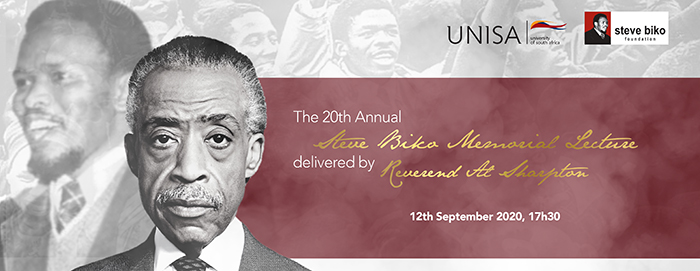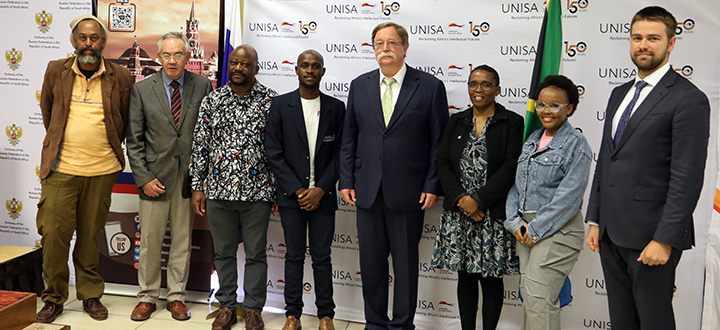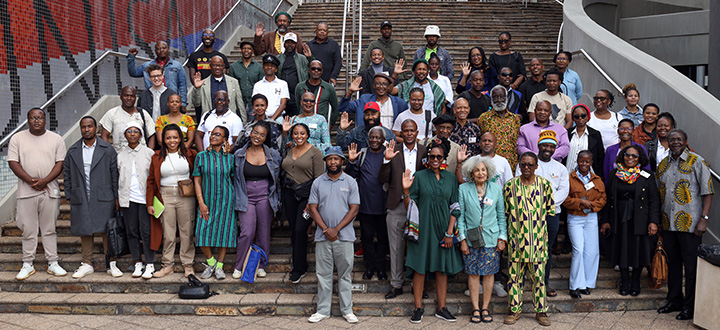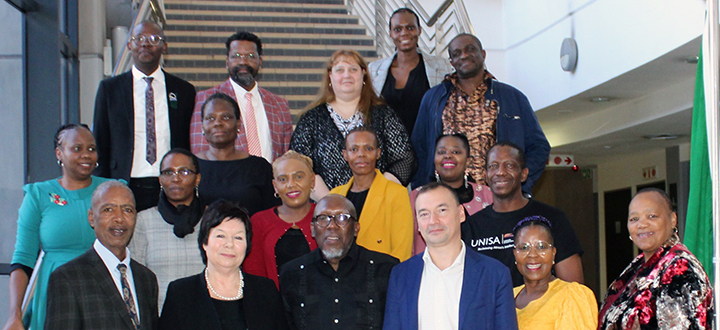News & Media
Resuscitating black consciousness
"Until we break our mental and psychic chains - until we become in tune with our self-awareness and reconnect to our history and the glory of who we are - then we will always accept being degraded, humiliated and being killed because we have psychologically indicated that that’s the way things are; we accept and deserve them," said Reverend Al Sharpton, a United States (US) civil rights activist, delivering the 20th Steve Biko Memorial Lecture at Unisa.

Known for his fearless character and anti-apartheid activism, the spirit of the founder of the Black Consciousness Movement in South Africa, Bantu Steven Biko, lives on. Unisa, in partnership with the Steve Biko Foundation (SBF), held the 20th annual Steve Biko Memorial Lecture virtually on 12 September 2020, a day that marks the 43rd commemoration of his murder in detention by state security officers in 1977.
Keep the flame alive
Unisa’s Director of VC Projects and Advisor to the Principal, Dr Somadoda Fikeni, who was the programme director, said that the lecture was about paying tribute to an "intellectual giant" and making sure that the flame he lit does not get extinguished. Fikeni expressed concern that, despite all the vaccines provided, the pandemics of racism and social injustice are still in existence over many decades.
In his welcome address, Unisa’s Principal and Vice-Chancellor, Prof Mandla Makhanya, reflected on some incidents of police brutality, social injustice and racism as recently experienced in both South Africa and the US. He added that Biko reflected on such developments and provided analytical tools that the university, the SBF, and many other institutions and organisations, could use to understand and advance the condition of black people.
Focus attention on contemporary challenges
The son of the late struggle icon and the founder of the SBF, Nkosinathi Biko, said the lecture is a resuscitative moment to the national calendar. "It uses the interest and legacy of Biko and the Black Consciousness Movement to focus our attention on the contemporary challenges facing our society. It does so by linking biography, history and social action." His concern about South Africa being the most unequal society remains, as the right to dignity and the right to life are constantly violated. Biko was delighted to have Sharpton deliver the lecture and described him as a leader who had made it uncomfortable to be comfortable with silence and indifference.
The lecture, themed #BlackLivesMatter, was delivered by Sharpton, an American civil rights activist described as a warrior of social justice. He is also known as an author, academic, and founder of the National Youth Movement and the National Action Network (NAN). Sharpton recently delivered a eulogy at the memorial service of the late African-American, George Floyd, a victim of police brutality in the US.
In the lecture, Sharpton reflected on apartheid, terrorism and slavery in the US in relation to South Africa’s struggles. He said Africa and the US were separated by an ocean but united in oppression. According to Sharpton, the different civil rights movements in South Africa and the US had the same goal of empowering and freeing black people, as well as to protect their existence.
Break mental and psychic chains
"The movement of Black Consciousness was personified by Biko to deal with our interests." He urged black people to break the mental and psychic chains in their minds, be in tune with their self-awareness, and reconnect to their history and the glory of who they are. "If you do not think you are worthy, you will not demand to be treated as worthy. It is not about what the whites think about us, but what we think about ourselves," reiterated Sharpton.
Sharpton alleged that Biko was a threat because of his ambition, self-love and for giving black South Africans their worth. Over and above, Biko demanded freedom and would not settle for anything else. Sharpton reminded everyone that freedom does not come from the oppressor but the oppressed.
He further emphasised that black people should not be victims of forced amnesia - that they should not allow anyone demonise those that fought for them. He also urged that they should not allow anyone to change their destination and what they fought for and that they must keep going for full emancipation.
"You killed Biko but you did not kill black consciousness; you were too late to kill it. We need to stand together and celebrate our blackness just as Biko did," concluded Sharpton.
"It is better to die for an idea that will live, than to live for an idea that will die." - Bantu Steven Biko
* By Nancy Legodi, Acting Journalist, Department of Instit
Publish date: 2020-09-17 00:00:00.0

 Unisa's student leadership engage with Russian ambassador
Unisa's student leadership engage with Russian ambassador
 Re-igniting and re-imagining Pan Africanism, Afrocentricity and Afrofuturism in the 21st century
Re-igniting and re-imagining Pan Africanism, Afrocentricity and Afrofuturism in the 21st century
 Unisa and Russian State University for the Humanities explore collaborative opportunities
Unisa and Russian State University for the Humanities explore collaborative opportunities
 Young Unisa science stars join elite Lindau Nobel Laureate group
Young Unisa science stars join elite Lindau Nobel Laureate group
 Education MEC addresses Unisa autism seminar
Education MEC addresses Unisa autism seminar